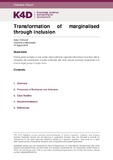| dc.contributor.author | O'Driscoll, Dylan | |
| dc.coverage.spatial | Somalia | en |
| dc.coverage.spatial | Papua New Guinea | en |
| dc.coverage.spatial | Namibia | en |
| dc.coverage.spatial | Somaliland | en |
| dc.coverage.spatial | India | en |
| dc.coverage.spatial | Cameroon | en |
| dc.coverage.spatial | Liberia | en |
| dc.date.accessioned | 2019-01-11T10:22:56Z | |
| dc.date.available | 2019-01-11T10:22:56Z | |
| dc.date.issued | 2018-08-07 | |
| dc.identifier.citation | O’Driscoll, D. (2018). Transformation of marginalised through inclusion. K4D Helpdesk. Brighton, UK: Institute of Development Studies | en |
| dc.identifier.uri | https://opendocs.ids.ac.uk/opendocs/handle/20.500.12413/14255 | |
| dc.description.abstract | This rapid review synthesises literature from academic, policy and non-government organisational (NGO) sources on the process of including excluded groups in the decision-making process or wider political system. Excluded groups refers to all groups that are marginalised, whether exclusion is based on race, sexual orientation, age, disability, gender, etc.. The review provides a number of examples of methods used towards the inclusion of marginalised communities, which are further highlighted through case studies. The focus is on examples where external support is a significant factor in success. Finally, the review highlights a number of recommendations that have been put forward in order to facilitate the inclusion of excluded groups. Although the literature is fairly strong on pathways toward inclusion for marginalised groups, it is limited when it comes to evaluations of donor/external support. For this reason this review includes a number of case studies where external/donor support was a factor, without going into much detail of the role they played. Key findings include institutions based on local culture can also bring marginalised communities into the decision-making process, which was the case with the Community Auxiliary Police (CAP) scheme in Bougainville, which is based on traditional customs and involves village chiefs. In addition to this, linking inclusion policies to poverty alleviation helps to provide impetus for change. Finally, study trips to see the implementation of inclusion policies first hand in similar countries, rather than just hearing about it from experts, can help to push forward reforms. | en |
| dc.language.iso | en | en |
| dc.publisher | IDS | en |
| dc.relation.ispartofseries | K4D Helpdesk Report;403 | |
| dc.rights.uri | https://www.nationalarchives.gov.uk/doc/open-government-licence/version/3/ | en |
| dc.subject | Governance | en |
| dc.subject | Participation | en |
| dc.subject | Rights | en |
| dc.subject | Social Protection | en |
| dc.title | Transformation of Marginalised through Inclusion | en |
| dc.type | Other | en |
| dc.rights.holder | © DFID - Crown copyright 2018. | en |
| dcterms.dateAccepted | 2018-08-07 | |
| rioxxterms.funder | Department for International Development, UK Government | en |
| rioxxterms.identifier.project | K4D | en |
| rioxxterms.version | VoR | en |
| rioxxterms.funder.project | 238a9fa4-fe4a-4380-996b-995f33607ba0 | en |

